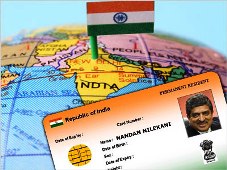 | « Back to article | Print this article |
 The Reserve Bank of India paved the way for using Aadhaar biometric authentication to transact with cards at automated teller machines and merchant terminals.
The Reserve Bank of India paved the way for using Aadhaar biometric authentication to transact with cards at automated teller machines and merchant terminals.
Announced at the second-quarter review of monetary policy, the move would make transactions at automated teller machines and point of sale terminals (PoS or merchant terminals) more secure.
RBI said: "One recommendation of the working group (with Gowri Mukherjee as chairperson) formed for securing card-present transactions was that banks could consider the Aadhaar biometric authentication, along with the MagStripe (magnetic stripe), as an additional factor of authentication for card-present transactions at ATMs and POS terminals."
Card-present transactions are those where cards are swiped into a machine or reader.
The central bank also said a pilot project using Aadhaar as an additional factor of authentication for card-present transactions had been scheduled in Delhi from November 15.
"Based on the outcome, further steps would be taken by the Reserve Bank," the